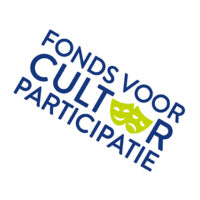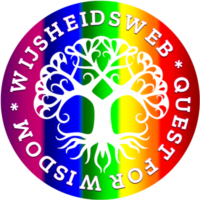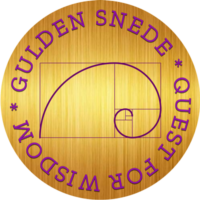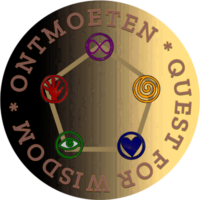R&D-team of QFWF
A programme, based on storytelling, the arts and intercultural dialogue…!
A Programme for enhancing global citizenship
Goal
Intercultural competences and transcultural arts-based educational materials
Using diverse cultural traditions of storytelling and different media to develop an arts-based programme for the enhancement of global citizenship by raising transcultural awareness and intercultural competences.
Idea
A research & development programme focussing on the educational power of storytelling, crossing borders of cultures and of media; developed under the auspices of the Quest for wisdom foundation.
Target group
Train the trainers: both in the educational field (elementary , high school level students) as well as in health care as an (inter)cultural ‘therapy’ for loneliness, depression, …; as well as in-company training for organisations in need for intercultural competences.
Organization
A collaborative project
- the Quest for wisdom foundation (QFWF)
- project-based collaboration with partners in educational & health-care fields
Designed by the R&D-team of QFWF
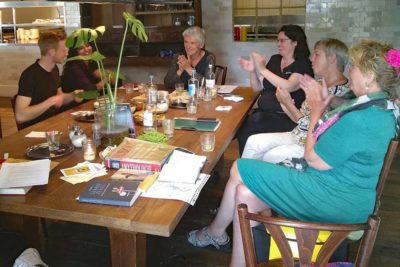 Louise Muller, PhD Religion and chieftaincy in Ghana
Louise Muller, PhD Religion and chieftaincy in Ghana- Nivedita Yohana, Doctorate in English Literature, University of Mysore, India
- Tess van Dongen, dra. English Literature, University of Nijmegen, Netherlands
- ….
1. The Annual Meeting Day 7th September 2019
For presenting and co-creating the art-based storytelling programme
The main goal will be an introduction to the art and power of storytelling: transcending cultural borders and creating coherence between people from different cultural backgrounds. Therefore the research question of the Annual Meeting Day will be: how might arts-based storytelling help to enhance global citizenship for different target groups, in terms of cultural diversity and intercultural competences and transcultural wisdom.
The Pre-announcement text:
“Het leven zelf is de grootste auteur!” Verhalen weerspiegelen de verbindende kracht waarin de eeuwigheid tot een eenheid van tijd, plaats en handeling is samengebald…. Al bewegend op het ritme van dag en nacht en gedragen op de wisseling der seizoenen, ontstaan plot en samenhang.
Stephen Fry schreef in het voorwoord van zijn hertelling van de Griekse mythen en heldenverhalen, dat zij
“… uit de verwarrende draden van het bestaan een compleet tapijt hebben geweven van legenden en verhalen.
De figuur Anansi reisde ten gevolge van de kolonisatie mee met de tot slaaf gemaakte Ghanezen en onderging in het Caribische gebied meerdere metamorfoses qua uiterlijk en karakter in een Surinaamse, Antilliaanse, Haïtiaanse, … held. Doorheen de culturele diversiteit belichaamt deze kleurrijke Anansi in de diaspora steeds humor, geslepenheid en rebelsheid!”
Rough outline of the programme
Highlighting 2 oral traditions from Ghanaian and Indian cultures:
African story telling game with Akan proverbs and Adinkra symbols
The art of Storytelling in Ghana with significant reference to “Kwaku Ananse” who is usually given such names as: Ananse the trickster, Ananse the wise man, Ananse the bad man etc. in most of his stories.
The Story behind the Akan Traditional Naming ceremony in Ghana.
The Pre-announcement text:
“In de orale cultuur van de Asante-bevolking, die in de zuidelijke regio West-Afrika (Ghana, Ivoorkust en delen van Togo) woont, zijn kunstwerken — bijvoorbeeld op gebruiksvoorwerpen, juwelen, gebouwen, kleding en koninklijke attributen — nooit als puur esthetisch bedoeld, maar nauw verbonden met gebruiken en morele waarden.”
Indian storytelling to discover transcultural themes in narratives: honesty, gender
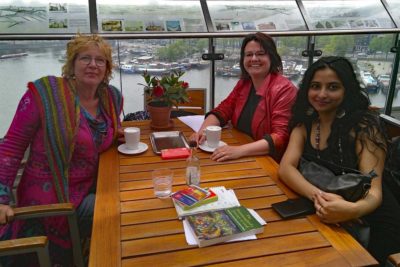 The tradition of storytelling has long been embedded in the Indian culture. Having a close knit family unit, the stories laced with wisdom is narrated to children by the elderly.
The tradition of storytelling has long been embedded in the Indian culture. Having a close knit family unit, the stories laced with wisdom is narrated to children by the elderly.
Katha (Story) is an Indian style of religious storytelling, performances of which are a ritual event in Hinduism. It often involves professional storytellers who recite Hindu religious texts such as Puranas, The Ramayana or Bhagavata Purana, followed by commentary.
Kathas sometimes take place in households, involving smaller stories related to the genre. Kathas instill moral values by revealing the consequences of human action (karma).
India being a land of diverse cultures has every state and district follow its own style of storytelling. While some narrate, others employ props like puppets, mask and even musical instruments. There are some that are told through the medium of dance and music.
The Pre-announcement text:
1. Bursting Gender Stereotypes across the Cultures
“In the story of Sita and the story of Buddha Rama and Buddha are both considered to be great men and there are even religions formed because of them however no one really acknowledges the fact that both these men abandoned their wives to follow their interest. Budhha was a prince married with a child however he abandoned all of it to get enlightenment. My intention in bringing up this topic is to question the stories narrated to us and decondition the mind. Sometimes, we get so habituated and conditioned to the stories that we fail to see the other side of it. There are no right or wrong answers but only to encourage people to form their opinions and agree to disagree.
The workshops plays around these narratives to see if people actually see the other side of the story or if they see what they have been conditioned. In relation to the gender we can also further ask What if Buddha was a woman and had abandoned her husband and child to get enlightenment would society have accepted her and formed a religion? Again, different cultures have a different perception of women.”
2. Themes that bridge Cultures
- Play around the story of the woodcutter and the goddess and how the theme of honesty connects different cultures. Another activity I would like to propose is for people to create their own character, pick 2 nationalities (2 different cultures) and play with it and then read out to others. I have divided
- A game based on Indian proverbs, categorized according to the natural elements. How are the associations between those elements and proverbs made from an Indian perspective? How are certain emotions associated to the elements?
- storytelling for philosophy with young children. Presenting a “do-game” in which words of a story or thought can be put in gestures or actions of expressions.
The programme is composed of mixed arts-based activities
- Wijsheidskaartenspel
- Muzikale dialoog met Surinaamse gedichten
- Congo tales in beelden
- ….
2. Follow up of the Storytelling Programme
Educational goals: Intercultural and Transcultural Bridges between cultures and through art-based media
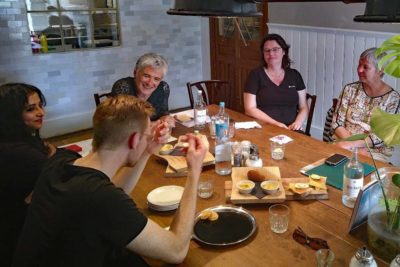 The QFWF-storytelling programme might be given a more general scope of enhancement of intercultural and transcultural competences for diverse target groups; or a specific educational focus, like ‘Burgerschapsvorming’ & 21st century skills. This focus would help broadening the horizon of the students in practicing the before mentioned 21st century skills, while giving knowledge about different cultures throughout the world.
The QFWF-storytelling programme might be given a more general scope of enhancement of intercultural and transcultural competences for diverse target groups; or a specific educational focus, like ‘Burgerschapsvorming’ & 21st century skills. This focus would help broadening the horizon of the students in practicing the before mentioned 21st century skills, while giving knowledge about different cultures throughout the world.
For ‘Burgerschapsvorming’ & 21st century skills
- Kritisch denken en Creativiteit
- Communicatie en Samenwerken
- Zelfsturing en Verantwoordelijkheid
Intercultural knowledge from (Indian, Ghanaian) storytelling traditions:
- For better appreciation of stories and the art of storytelling;
- Acquainting children, students with other cultures and explore the differences;
- Making children, students curious about each other’s (inter)cultural backgrounds
- …
Conveying the trans-cultural values in/ through the stories being told, about ‘the art of living’ (different perspectives on ‘the good life’).
- Help children, students to articulate (moral, social, multicultural, …) experiences, appealing the imagination by means of storytelling and other arts-based activities;
- Acquainting children, students with different (cultural) perspectives on ‘the good life’ and explore the differences
- …
Awareness of mono-cultural biases and raising consciousness, becoming open for trans-cultural values
- Sharing the (inter)cultural backgrounds of the children, students to elicit different perspectives on festivities, nature, gender, jobs, …;
- Exploring differences and similarities;
- Raising awareness of biases from one’s own culture
- Stimulating appreciation of each other’s personal and (inter)cultural differences
- …
Ideas about how the activities could be run
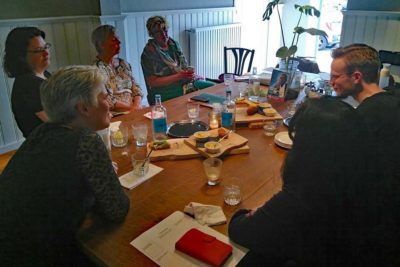 The programme could be done by printing out pictures of people dressed in their traditional attires and also show them little clips of videos doing their respective traditional dances.
The programme could be done by printing out pictures of people dressed in their traditional attires and also show them little clips of videos doing their respective traditional dances.
So in this way, by showing colourful visuals and music to the children we can get them interested and curious to know about other cultures.
The children are step by step introduced to the cultures little by little. In this way they will get curious and interested in various activities and then go in-depth into the intercultural significance of cultural symbols etc.
The involvement of parents and teachers would be helpful in that they can assist with the reading and demonstration of art to the children. The children would also best appreciate the activities of the day if people they can better associated with are also partakers of the activities of the day.
Who would run the programme
R&D-team of QFWF:
- Louise Muller, PhD Religion and chieftaincy in Ghana
- Nivedita Yohana, Doctorate in English Literature, University of Mysore, India
- Tess van Dongen, dra. English Literature, University of Nijmegen, Netherlands
- ….
Partners to collaborate
In addition to the before mentioned educational goals the QFWF is looking for partners with whom to collaborate, both on an organizational level as well as by using the networks of people individually.
For example the QFWF is exploring the possibility of a collaboration between QFWF, a library and a school, through which a broader community could benefit as well. As the event could be held at the library premises, it would allow the students to better adopt and appreciate regular usage of the community library.
It would make the school community and guardians appreciate the agenda of QFWF so that it creates ground for funding for future projects.
Ideas for a longer term Programme
Introduction
The Programme serves as introduction to the aim of intercultural storytelling
Theme 1 Introduction to Asian traditions
Both west Asia and east Asia…
Story retelling is an important pedagogical tool to help students improve their memory power, oral communication, listening abilities and sequencing skills.
Students need to learn how to listen and narrate a story well. If it is done by using a game or an activity, children become more motivated and creative.
India being a land of diverse cultures has every state and district follow its own style of storytelling. While some narrate, others employ props like puppets, mask and even musical instruments. There are some that are told through the medium of dance and music.
- Using the traditional Indian folktale book “Panchatantra”
to narrate stories followed by discussion. Encouraging the listeners to question, voice their opinion, listen to other’s perspective to articulate.
Storytelling done through traditional music, drama, dance, poetry, and philosophy.
- Narrating a story
and then making listeners to repeat the story in their own words and give an alternate ending.
- Story Circle
One person begins a tale and stops after a few sentences. The next person picks up the story thread and continues it, then stops. Next person adds to it and so on until the tale comes to a resolution.
The story could begin with a pre-selected title or subject to guide the improvisation.
- Story around Proverbs
Have students pick a familiar proverb for example: “Slow and steady winds the race” and encourage them to come up with a story that proves this proverb — the age old wisdom. Multicultural proverbs offer interesting insights into the universality of wisdom as well. Invite students to look at proverbs creatively and imagine the story the proverb suggests.
For example:
- One finger cannot lift a pebble. (Iranian)
- When elephants battle, the ants perish. (Cambodian)
- If you chase two hares, you will not catch either. (Russian)
- The pot calls the kettle black. (United States)
- It is better to turn back than to get lost. (Russian)
- Talk does not cook rice. (Chinese)
- To hide one lie, a thousand lies are needed. (India)
- Creating Personal Fables
Ask students to assign animal characters to represent people they know. This is a private process and no one but the student needs to know which animal represents the student’s mother, teacher, brother, or, themselves, etc. Have students create a story staring those animal characters
- A Picture is Worth 1000 Words
A class selects a classical painting. Looking at the painting for inspiration, the class constructs the first few sentences of a tale through group discussion and suggestion.
Theme 2 Introduction to African cultural traditions
From the Ghanaian tradition in particular:
Each bullet point represents a lesson and the idea is to organize monthly programs for schools where each of these lessons would be taught to the students, accompanied by pictures and videos to make it more interesting.
It is structured that for each (weekly?, monthly?) session there will be something new to be taught and learned.
- The art of Storytelling in Ghana with significant reference to “Kwaku Ananse” who is usually given such names as: Ananse the trickster, Ananse the wise man, Ananse the bad man etc. in most of his stories.
- The Story behind the Akan Traditional Naming ceremony in Ghana
- Traditional Marriage Ceremony in Ghana
- The story behind ancient games in Ghana and how it promoted togetherness in the community (games like:
- Oware, played by all age groups.
- Ampe, usually played by young ladies in the community.
- Ludu, usually played with dice and by all age groups.
- The significance of Assase Yaa (the Earth god) in pouring of libation in Ghana. Libation pouring in Ghana was the traditional prayers that our forefathers offered to the Supreme Being, being the God of Heaven and the Lesser gods of the earth in wedding ceremonies, naming ceremonies and funeral ceremonies etc. before the arrival of the colonial masters which brought about Christianity. However, libation pouring is still being practiced in most major functions in Ghana.
- The story behind Libation pouring in Ghana and the art of doing it.
- The story behind the art of farming in ancient Ghana called “Indoboa” (Literally meaning help farming) where all the farmers in the community will assist one farmer in weeding and planting his crops and then jump unto another person’s farms to do the same until all the farmers have had their farms in shape. In the olden days the major occupation of the people were farming and hunting and that was what they did for a living, hence “Indoboa” was very significant in their culture.
- The story behind the commanding of the Golden Stool of Okomfo Annokye (Okomfo means a traditional chief priest in Ghana) from the heavens to the earth. And the story behind how the Golden Stool became is a symbol of the strength of the Ashanti Kingdom of Ghana.
- The story behind how Tetteh Quarshie smuggled a cocoa bean from Fernando Po to Ghana and how that single cocoa bean ultimately became the heart and soul of the Ghanaian economy till date.
- The traditional art of drumming and dancing in Ghana.
- The art of installation of a Chief in Ghana.
Theme 3 Critical thinking and Creativity sills: Introduction to intercultural perspectives and arts-based activities
For the students (at the library/ school) at specific days of the week.
- The reading and reciting of Dutch, English, Indian, Ghanaian poems around a particular theme (like marriage celebrations) intertwined with Dutch, English, Indian, Ghanaian
- Narrate stories behind cultural symbols, figurines.
Ask students to draw the figurines they liked the best using pencil and crayons; and explain what really impressed them about that story.
- Listen to music from these countries and Dutch, English, Indian, Ghanaian cultures
Ask students what they think of the music? Does it make them feel like dancing?
- Show students how festivities are celebrated in Dutch, English, Indian, Ghanaian
Ask what they think about it?
- To encourage students to narrate a story, how they spent their last summer
Ask them what did they like the most.
Theme 4 Communicative & Collaborative skills: Introduction to competitive and cooperative activities from intercultural perspectives
Structuring a workshop on stimulating the imagination with a cooperative touch
The students could be divided into three groups of 10 students to a group and one chosen book and its creative art work from each of the three settings or continents would be the subject of demonstration and discussion between the instructors and the students for each group, after which we change until all three groups have had their turn in experiencing all three different cultures.
A competition to test the understanding of the students could also be held at the end of the day and prizes could be awarded (subject for further discussion)
Structuring a workshop on stimulating the imagination with a cooperative touch
A story could be narrated to students followed by questions based on the story. It is asked to challenge their beliefs thus encouraging them to expand their horizon of thinking. Encourage them to interact with other children to understand their point of view thus validating their opinions.
Theme 5 Agency & Global Responsibility skills
What are the activities you would recommend? Stories, music, folk tales and such.
Theme 6 Introduction to Middle eastern tradition
What are the activities you would recommend? Stories, music, folk tales and such.
Theme 7 Introduction to Native American tradition
What are the activities you would recommend? Stories, music, folk tales and such.
2019-06
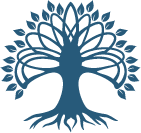
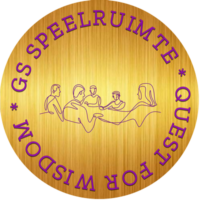
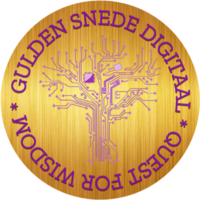
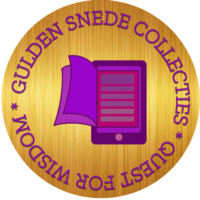




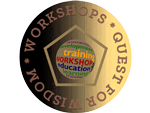 Thema: Zinvolle gesprekken Rond de Speeltafel of Rond de Dialoogtafel:
Thema: Zinvolle gesprekken Rond de Speeltafel of Rond de Dialoogtafel: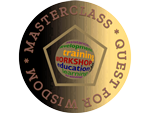 Thema: Masterclass begeleiding door spel & dialoog
Thema: Masterclass begeleiding door spel & dialoog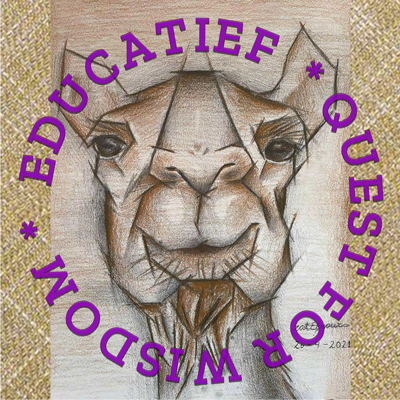
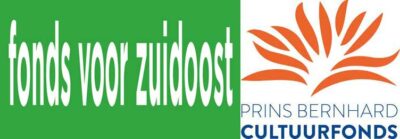
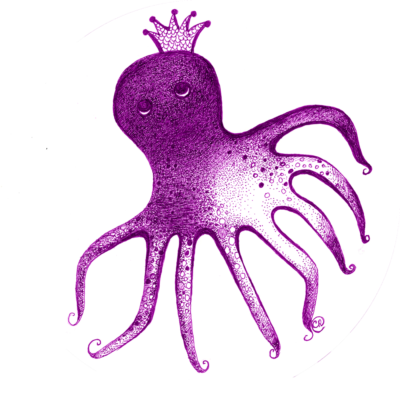
 Met een subsidie van het
Met een subsidie van het 